Greaves Cottons on to electric mobility
Greaves Cotton along with Ampere Vehicles is taking the plunge into EVs to provide both last-mile affordable mass mobility and a charging infrastructure too
The largest small diesel engine manufacturer in India is eyeing a future beyond fossil fuels by developing fuel-agnostic powertrain technologies including CNG. Having acquired a stake in Ampere Vehicles, the Mumbai-based firm is now among the first OEMs taking the plunge into EVs to provide both last-mile affordable mass mobility and a charging infrastructure too.
The times, they are a-changing. And moving with the times is just what the 160-year-old Mumbai-based Greaves Cotton is doing. Unwilling to rest on its past laurels to stay relevant in the future, which essentially will be a fast-changing mobility landscape, the primarily small diesel engine maker is betting big on EVs to charge its future growth.
At present, its revenue split between small diesel engines, the aftermarket and new business is 49, 25 and 25 percent respectively. The company believes this is likely to change dramatically over the next decade, which is why it is working on fuel-agnostic powertrain solutions including a strong focus on electric vehicles (EVs) in the form of scooter and load-carrying vehicles targeted at last-mile connectivity and delivery, through its recent acquisition, Ampere Vehicles of Coimbatore.
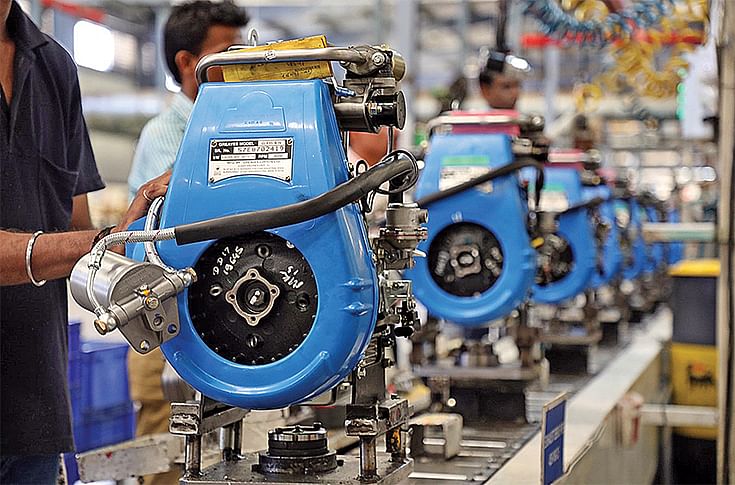
Greaves' four-cylinder 'Leap' lightweight diesel engines are popular with 3-wheeler and small 4-wheeled commercial vehicle OEMs in India. While Piaggio Vehicles is a longstanding customer, Mahindra & Mahindra has come on board to source BS VI-compliant powertrain solutions for Mahindra three-wheelers
“We clearly anticipate that, over a period of time, the new business will grow significantly faster and fuel our growth in the future. As fuel preference changes in India, Greaves will be ready for the fuel of the future, and we are making the technological shift with a commitment of investment. While doing this, our deeper understanding of the last-mile customer over several years will help us in this journey,” says Nagesh Basanvanhalli, MD and CEO of Greaves Cotton.
The extent of Greaves' stranglehold on the small diesel engine market is reflected in the fact that seven out of 10 autorickshaws in India are powered by Greaves engines, which translates into a 70 percent market share in diesel three-wheelers in India. The company has 5 million engines on the road, produces an engine every minute, transports 500,000 tonnes of cargo and 10 million passengers every single day, with 9,000-plus strong service network to boot. Its two-year-old Greaves Care B2B initiative has a base of 150,000 customers and is growing rapidly.
Bullish on CNG, Greaves Cotton has partnered with a US-based company to introduce a new CNG technology claimed to deliver 25 percent higher fuel efficiency compared to the IC engine. Given the growing preference for eco-friendly fuels, the company believes its engine business will come down to 40 percent by 2024 as its other businesses, primarily the EV pie, will grow rapidly. Therefore, as part of its future growth plan, Greaves is aggressively investing in EV products, technologies, production capacities and infrastructure to stay relevant and also at the forefront of the EV game.
Plugging into Ampere
Providing affordable mobility is a core goal for Greaves Cotton and it has strategically moved to a fuel-agnostic solutions portfolio including diesel, petrol, CNG and electric as the market continues to evolve.
In August last year,taking a big bet towards yet other important emerging mobility solution, Greaves acquired the Coimbatore-based EV start-up Ampere Vehicles. Set up in 2008 and founded by Annamalai Hemalatha, Ampere is today a leading brand in the last-mile mobility EV segment.
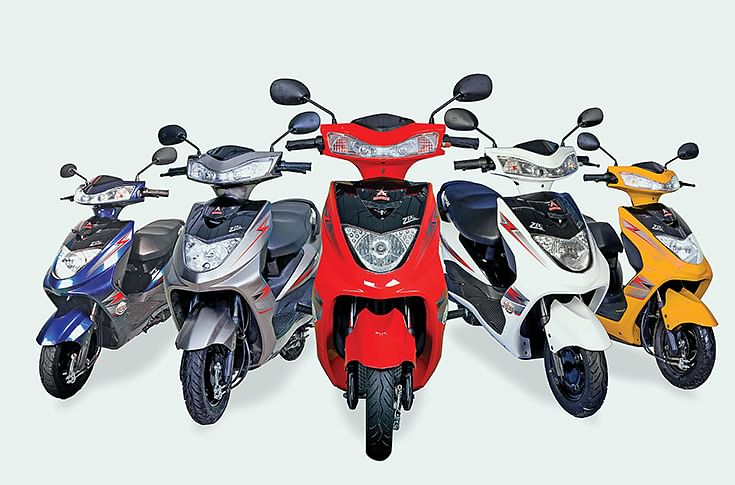
Ampere Vehicles, Greaves Cotton's e-mobility arm, recently launched the Zeal electric scooter, which has a top speed of 55kph and a 75km travel range with charging time of 5.5 hours. Under the FAME II benefit, it gets a Rs 18,000 subsidy.
Ampere has strong in-house capabilities in designing, developing, manufacturing and marketing of EVs across applications. With Ampere, Greaves plans to leverage the home-grown, innovative EV maker to muscle ahead in the EV game. Ampere has a wide product portfolio catering to both personal and industrial applications that lie in the Rs 35,000 to Rs 100,000 price range. Ampere is known to be the first company to have launched a 60-volt scooter in India. At present, the EV maker has over 40,000 scooters running on Indian roads, primarily in semi-urban and rural areas.
The company now eyes more traction in urban India where it finds considerable potential for last-mile connectivity applications. Ampere retails three low-speed scooter models and one high-speed model, along with a three-wheeler load carrier and passenger carrier, golf cart, electric cycle and industrial applications. For Ampere which , over the past decade, has developed and enjoys a strong brand connect with consumers in semi-urban and rural areas, the backing of a strong industry player like Greaves is essential if it is to make its presence felt in the urban and rural markets to achieve its next phase of growth.
Hemalatha Annamalai, managing director, Ampere Vehicles, says: “There is a huge opportunity in the personal commuter space and we are scaling up rapidly to take advantage of this. Ampere has been able to build capabilities because we are extremely good in powertrain — the motor, controller, charger and converters — which is being designed, develop and manufacture in-house at Coimbatore, which makes us unique in the market."
Zeal for electric mobility
Expanding Ampere's electric scooter range, last month Greaves launched the new high-speed Ampere Zeal at Rs 69,000, which is approved under the FAME II scheme with an Rs 18,000 subsidy per scooter. The company says the Zeal's running cost of a minuscule 0.16 paise per kilometre offers nearly 90 percent cost saving over a petrol scooter. What is helping Ampere keep costs low is its robust supplier base in Coimbatore to source critical parts for its vehicles. The Zeal, for example, is 85 percent localised.
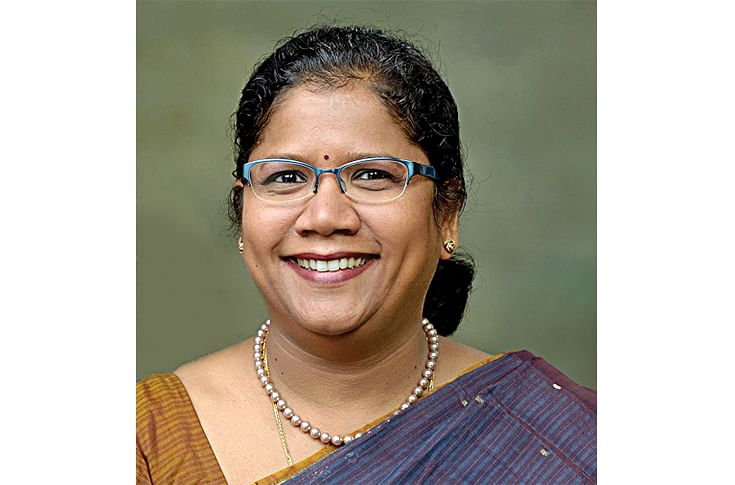
Ampere Vehicles' Hemalatha Annamalai: "We are extremely good in EV powertrain — motor, controller, charger and converters — designed, developed and made in-house."
The Zeal, which was completely designed and developed in Coimbatore in 18 months flat, comes with 60V 7.5A lithium-ion batteries that take 5-6 hours to charge and offer 70-75km travel on a single charge, with both Power and Eco mode. The lightweight scooter goes from 0-50kph in 14 seconds and is claimed to have the highest power-to-weight ratio. Other highlights of the Zeal are tubeless tyres, anti-theft alarm and a digital display. The Zeal has been commercially launched in Tamil Nadu and will gradually be introduced in other parts of the country. The company says initial customer feedback is encouraging especially about the styling quotient, ride quality and handling.
“Being an entrepreneur driving this venture, one of the social goals is women empowerment and today 40 percent of the workforce at the assembly line comprises women. Secondly, our constant focus is on job creation, so we offer jobs to engineering students from Tier 1 and 2 towns and help make them industry-ready,” says Hemalatha.
Building an EV eco-system in India
Greaves Cotton is not just banking on a superior product and affordable price to achieve scale. It has a larger game-plan in place with an EV business team working to solve all customer pain-points. Mindful of the fact that EVs are just about starting to find their feet in India, the company believes customers need strong handholding to make their EV experience a satisfying one. Therefore, a 360-degree approach is being adopted, which involves being with the customer from the point of sale through to service, spares and charging network. Greaves has set up a 24x7 call centre for customers to reach out. Comprehensive customer support will help accelerate EV adoption in India and Greaves has also begun offering finance to both low and high-speed e-bike buyers in India through a partnership with financial institutions. What's noteworthy is that it is the first company to offer finance for low-speed electric bikes in India.
Greaves Cotton's Nagesh Basanvanhalli: "Greaves is ready for the fuel of the future and we are making the technological shift with a commitment of investment."
According to K Vijaya Kumar, president, Greaves Cotton, “The first primary goal is creating a service infrastructure across India. At present, we have 325 outlets, which makes us one of the largest EV service networks in India. We also supply spares, which are made by us, through our strong retail touch-points. Now the goal is to set up 5,000-plus retail touch-points with charging points across India.”
The overarching plan is to provide a hassle-free ownership experience with a charge-anywhere service across the country. This plan will involve setting up nearly 5,000 charging stations in a phased manner. The first 100 outlets are planned in the next 2-3 months time, starting from the Southern part of the India where the company already has higher penetration. Greaves is now working aggressively to set up charging facilities at petrol dispensing stations, malls or other commercial places to create a charging network for an easy, comfortable and convenient EV ownership experience.
Greaves believes India is changing rapidly in several ways, what with the Metro coming up in several cities, change in commuting habits like shared mobility solutions, last-mile connectivity and also emerging services like bike renting. “We are offering our customer a similar experience in the EVs what is used to getting today. We will be the first large player to set the standards and deliver to our customers. In servicing EVs today, we are one of the largest players in India," says Vijaya Kumar.
Dual-battery strategy
Unlike its peers, Greaves offers both lithium ion and lead-acid batteries for its scooters and e-rickshaws. Commenting on this dual-battery strategy, Hemalatha says typically, in India, customer expectations are highly diverse and every market has its nuances. This means one technology is not suitable for everyone. Also, lead-acid battery is a proven technology but lately lithium ion has picked up worldwide but is expensive than lead acid. Customers in semi-urban or rural areas may not be able to afford a change of lithium-ion battery in 2-3 years but can with a lead-acid battery. At present, Ampere is carrying out a pilot with local battery makers for lithium-ion batteries.
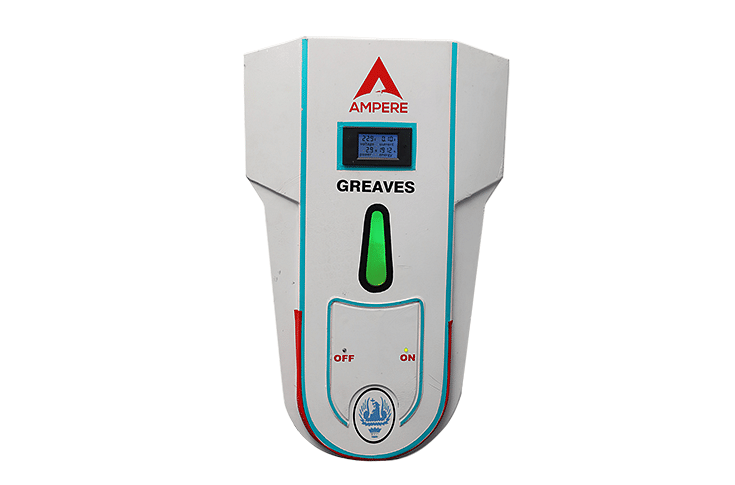
Wall-mounted 60V charger for EVs
Some insights and feedback from EV buyers is that they are quite conscious of the price of the scooter and the running cost. Secondly, they are also looking at the convenience of using an electric scooter. “The important aspect today, compared to 2008 when Ampere started, is that awareness about electric vehicles has significantly increased among average consumers. This is partly because of the push by the government, and partly consumers are also looking at other conveniences offered by an EV,” says Hemalatha.
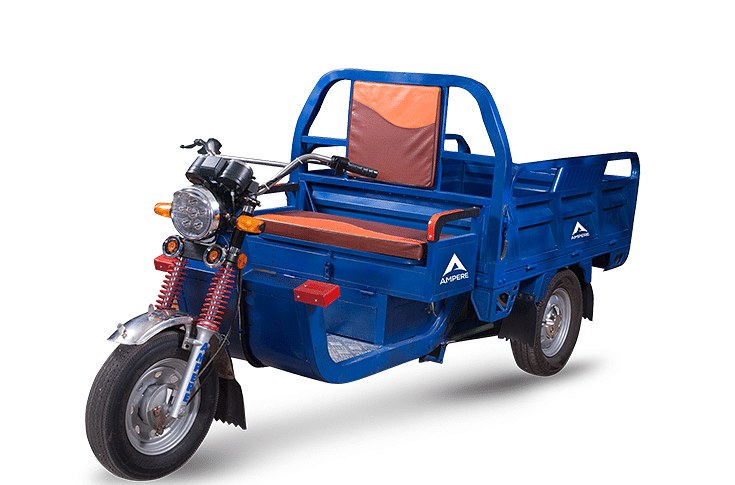
Mitra load carrier with a 250-400kg payload for industrial applications
Speaking on the charging network and range anxiety, Basanvanhalli says: “The Ampere teams have been working on EVs over the past 10 years. As a result, we have the technologies available especially on
the charging. The real question is: can we scale it up? The answer is yes, but the approach is methodical with the increased usage with the right value proposition.”
Wall-mounted charger
Successful EV penetration can be achieved by providing a robust, convenient easy to use charging infrastructure. To address this, Greaves has developed a couple of charging solutions like a wall-mounted charger for 60V vehicles where multiple EVs can be charged simultaneously. This is targeted at residential apartments for multiple chargers where the charging sockets aren’t available at every parking place.
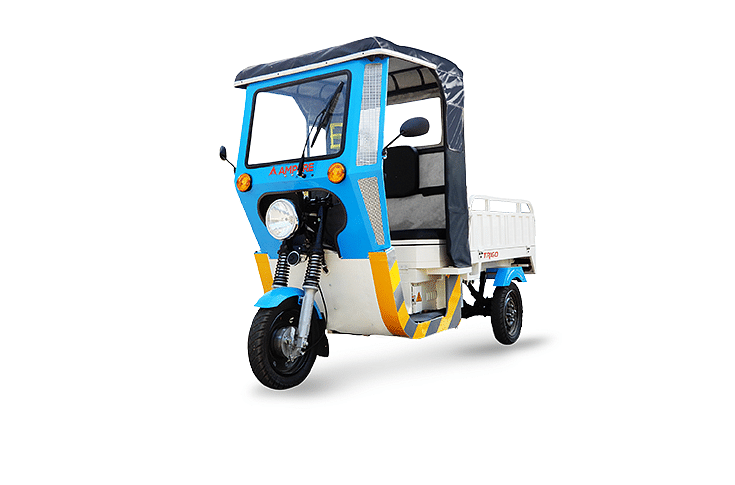
Trigo load carrier with 250kg payload
The wall-mounted charger, which is equipped with an ISI-certified energy meter to source power supply directly from an electricity supplier, can record how much energy is consumed. This charger can be used for any 48 or 60 volts vehicle for normal charging (5-6 hours) and deployed at the commercial places like cafés or malls. And, in an apprach similar to what Ather Energy has done, Greaves is forging partnerships with commercial establishments to set up its chargers, and also with customers in their garages.
Greaves has another charging solution called ‘Array Charger’. This indigenously developed solution by Greaves and Ampere is meant for fleet customers who use a large number of scooters for commercial operations. Array Charger is a proof of concept which carries out fast charging irrespective of the vehicle voltage; as many as six scooters can be charged at a time. These chargers are going to be deployed shortly as a pilot.
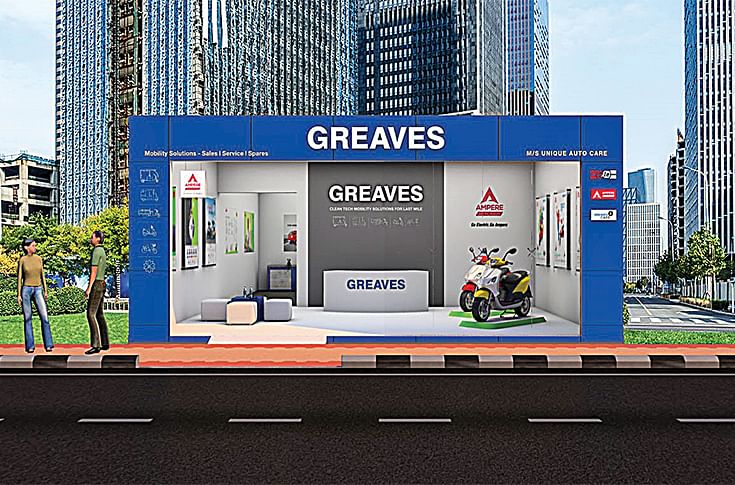 Greaves Cotton is to soon unveil a new retail branding strategy for its clean technology and last-mile transportation solutions.
Greaves Cotton is to soon unveil a new retail branding strategy for its clean technology and last-mile transportation solutions.
In a nutshell, Greaves Cotton aims to become an end-to-end EV eco-system provider by developing and retailing products, technology platforms and customer care through Ampere, infrastructure, service and aftersales support. The company says there are 200 million people at the bottom of the pyramid in India who need affordable, efficient transportation. With Ampere, the company believes it has considerable growth opportunities as
EVs get into acceleration mode, with the government also providing ample support.
“We encourage other large OEMs in India to join the two-wheeler EV industry, which has really big potential. This is an opportunity where awareness is growing significantly. Therefore, if a couple of major players come along, it will help everyone to provide responsible and reliable transportation on a mass scale,” concludes Basavanhalli.
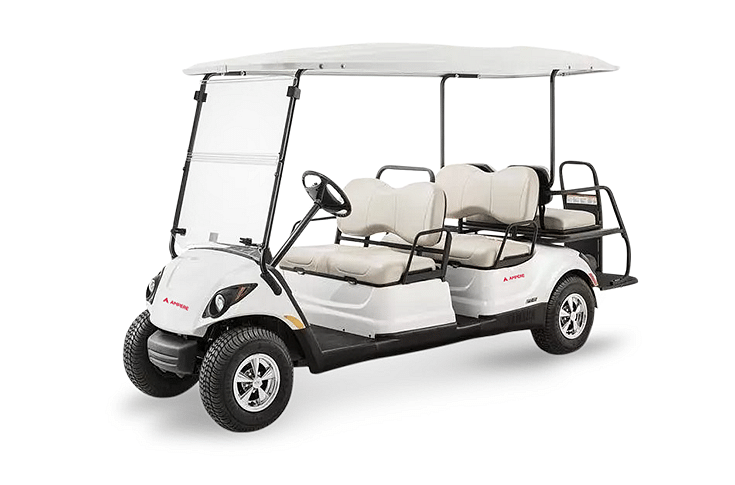
An Ampere electric golf cart. It can seat 4-6 people, goes 70km on a single charge and has a top speed of 25kph
It's still early days yet and the government too has thrown down the gauntlet to two- and three-wheeler OEMs to go all-electric by 2023 and 2025 respectively. While leading OEMs have asked for more time to come up with a decisive EV roadmap, Greaves Cottton has already charted out its own. Now it's time for the consumer to plug in.
(This article was first published in the July 1, 2019 issue of Autocar Professional)
RELATED ARTICLES
RSB Group Prepares for Hyper-Growth: New Markets, Tech and Mission ₹10,000 Cr
From a small workshop in Jamshedpur to an engineering group with global reach, RSB Transmissions is preparing for its mo...
Beyond Helmets: NeoKavach Wants to Make Rider Airbags India’s Next Safety Habit
As premium motorcycles proliferate and riding culture evolves, an Indo-French venture is betting that wearable airbags, ...
Inside Mahindra Last Mile Mobility’s Rs 500 Crore Modular Platform Strategy
Mahindra Last Mile Mobility has launched the UDO, an electric three-wheeler built on a new Rs 500-crore modular platform...






 01 Aug 2019
01 Aug 2019
 29776 Views
29776 Views




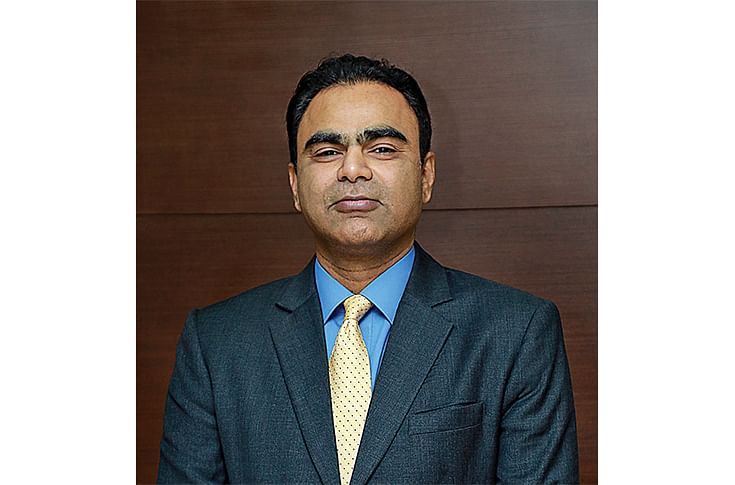

 Darshan Nakhwa
Darshan Nakhwa



 Shahkar Abidi
Shahkar Abidi

